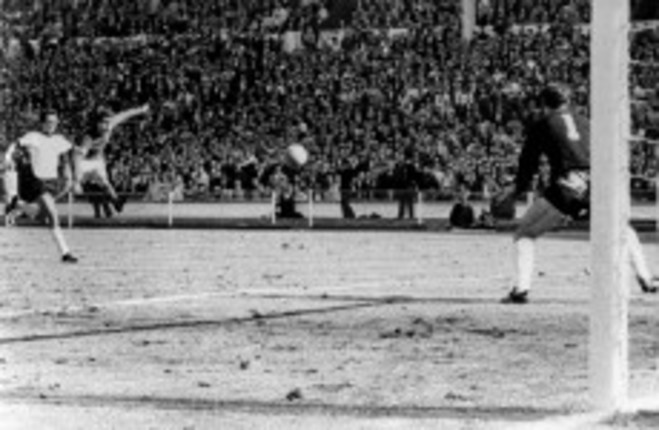1. “Whispering” Ted Lowe calls snooker’s first televised century
IT’S ONLY RIGHT that we begin this week’s column by paying tribute to the man whose death earlier this week inspired it.
For 50 years, “Whispering” Ted Lowe was the BBC’s voice of snooker, the man responsible for capturing and relaying the drama and intensity of countless games of snooker, bringing the sport to listeners and viewers around the world with a gripping immediacy.
Lowe’s first foray into sports commentating came in 1946 when he was asked to deputise on a ten-minute BBC radio slot which was covering a tournament in London’s Leicester Square. Anxious that he, a complete rookie, would not disturb the players in action just feet away from him, he pressed his mouth to the microphone and whispered.
Thus, one of the most distinctive commentating styles in all of sport was born.
However, it was not on radio but on television that Lowe’s finest hour occurred, putting words on a timeless moment in snooker history as 15-time World Champion Joe Davis made the first televised century break in 1962.
You can be sure that Lowe was certain of the significance of what was happening before him. Still, his voice never wavered nor rose even a decibel.
As Davis fired home the blue to complete his ton, “Whispering Ted” let the words do the talking as always, calmly informing the watching world “there we have a century on television.”
2. “Your boys took one hell of a beating”
There is absolutely no reason whatsoever for even the nerdiest football anorak to recall much of the detail concerning Norway’s 2-1 victory over Ron Greenwood’s England in the 1982 World Cup qualifiers.
If I told you that Bryan Robson, Roger Albertsen and Hallvar Thoresen were the three goalscorers that evening, what else could you possibly want to know?
Yet, the game has become enshrined in sporting folklore not because of anything which happened on the pitch in Oslo but because of one inspired and impassioned moment of commentary genius.
Bjorge Lillelien was to Norway what Micheal Ó Muircheartaigh (more on him in a minute) is to Ireland – the man for whom you would turn down the television and turn up the radio.
Who else would you want calling home the final seconds of one of your country’s finest footballing successes?
Forget for a moment that Norway were not the best team in the world, as Lillelien had jubilantly proclaimed. Nor, as he also boasted, had they ended any hopes which Greenwood’s men harboured of qualifying for the World Cup finals in Spain (a 1-0 win over group winners Hungary in the final game would be enough to secure their progress).
Nonetheless, Lillelien’s spontaneous outpouring of emotion resonated with everyone who had ever experienced any form of underdog triumph.
The minnows of Norway had beaten one of the footballing superpowers – not just that, but one of the world’s historically great nations as the commentator’s litany of crestfallen political and cultural giants indicated.
Regardless of its ultimate significance, this was a win for the little fella – and Lillelien was the perfect man to put words on the thoughts which so many had previously felt but few had the capacity or inclination to articulate.
We are the best in the world, we are the best in the world. We have beaten England 2-1 in football. It is completely unbelievable, we have beaten England!England, birthplace of giants. Lord Nelson, Lord Beaverbrook, Sir Winston Churchill, Sir Anthony Eden, Clement Attlee, Henry Cooper, Lady Diana–we have beaten them all. We have beaten them all.
Maggie Thatcher, can you hear me? Maggie Thatcher, I have a message for you in the middle of the election campaign. I have a message for you: we have knocked England out of the football World Cup. Maggie Thatcher, as they say in your language in the boxing bars around Madison Square Garden in New York: your boys took a hell of a beating, your boys took a hell of a beating!
3. Ó Muircheartaigh – simply the best
An national institution, Mícheál Ó Muircheartaigh is more Irish than a weirdly delicious sounding combination of Barry’s Tea, Tayto Crisps and TK Red Lemonade all rolled into one.
For the people of Ireland and the country’s diaspora scattered in every corner of the globe, the Kerryman’s encyclopaedic knowledge, verbal artistry and quick wit have become an irreplaceable element of our national sport.
Considering the breadth and quality of Ó Muircheartaigh’s career in sports broadcasting, it seems almost churlish to try to identify one particular instance which stands above all others as the definitive moment in his back catalogue.
So, with all of the necessary caveats and disclaimers attached, here are five of my own personal favourites from the canon of man whose work might never be bested.
- “Teddy looks at the ball, the ball looks at Teddy.”
- “The stopwatch has stopped. It’s up to God and the referee now. The referee is Pat Horgan. God is God.”
- “Colin Corkery on the 45 lets go with the right boot. It’s over the bar. This man shouldn’t be playing football. He’s made an almost Lazarus-like recovery from a heart condition. Lazarus was a great man but he couldn’t kick points like Colin Corkery.”
- “Teddy McCarthy to John McCarthy, no relation. John McCarthy back to Teddy McCarthy, still no relation.”
- “Brian Dooher is down injured. And while he is, I’ll tell ye a little story. I was in Times Square last week and I was missing the championship back home. So I approached a news stand and I said, ‘I suppose ye wouldn’t have the Kerryman, would ye?’ To which the Egyptian behind the counter turned to me and he said, ‘Do you want the north Kerry edition or the south Kerry edition?’ He had both, so I bought both. And Dooher is back on his feet…”
4. “Some people are on the pitch …”
If there is one quality which connects of all of the moments featured in this week’s column, it is their spontaneity.
In truth, that is their beauty.
After all, it is no great challenge to memorise some trite cliches with the sole intention of regurgitating them at the most appropriate moment. Rather, the skill of truly brilliant commentary is in articulately and imaginatively capturing the essence and significance of a given sporting moment – often, in the modern era, as the audience watches the action unfold in front of their very eyes.
There were any number of ways in which BBC commentator Kenneth Wolstenholme could have described the scenes which unfolded in the lead up to Geoff Hurst’s third goal in the 1966 World Cup Final.
In fact, I shudder to even think of how a less adept professional may have butchered the moment – questioning the referee for shaping as if to blow the final whistle and then waving play on; blathering on about a “disappointing” pitch invasion which threatened to take the sheen off England’s success.
Perhaps I give Wolstenholme too much credit – maybe the speed at which events unfolded aided him, leaving him only enough time to describe what he saw without the luxury of embellishment or analysis.
Whatever the case, his words have gone down in history.
“Here comes Hurst, and … some people are on the pitch, they think it’s all over. It is now – it’s four.”
5. Al Michaels captures “the Miracle on Ice”
For better or for worse, when commentators are calling a sporting event involving their own national team, the traditional rules of objectivity and impartiality often go out the window.
The bias which creeps in is a double-edged sword, the broadcaster forging a stronger connection with much of the audience but also running the risk of becoming just another blinkered cheerleader.
Sometimes, though, the tone and the moment is just right as Al Michaels’ commentary on the 1980 Olympic ice hockey semi-final between America and the USSR demonstrates.
With the Cold War ongoing, the match became more of a political allegory than a sporting event. Ice hockey was perhaps the one field in which the Russians unquestionably had the upper hand, having won gold at every single Olympic Games from 1964 to 1976.
Nobody gave a bunch of American amateurs much chance against a well-oiled Soviet machine. To beat Russia, they would need … well, nothing short of a miracle.
As the improbable slowly transformed into reality on that February night in New York, Al Michaels simply told it as it was.
“Eleven seconds, you’ve got ten seconds, the countdown going on right now! Morrow, up to Silk. Five seconds left in the game. Do you believe in miracles?…YES!”
6. Harry Carpenter calls the Rumble in the Jungle
When people describe Muhammad Ali as a boxing genius, it is often a reference to those moments of tactical inspiration which caused him stand out from the crowd – the “rope-a-dope” technique, for example, conceived and executed to perfection in the Rumble in the Jungle against George Foreman.
It was a ballsy move by Ali who, at 32 years of age, was desperate to win back the WBA and WBC Heavyweight titles which he had been stripped of in 1967. But it worked.
In fact, it worked so well that the self-proclaimed “Greatest” duped not only his opponent but British commentator Harry Carpenter, calling the fight live for BBC Radio, as well.
As the clock ticked towards zero in the eighth round, Ali had convinced Carpenter that he was running on empty.
“Suddenly Ali looks very tired indeed. In fact Ali, at times now, looks as though he can barely lift his arms up,” he told listeners.
At the exact moment that the words left Carpenter’s mouth, Ali sensed his opportunity and pounced, flooring the champion with a huge right from which he wouldn’t get up.
Set against the background of what had gone before, the stunning speed of the Ali’s “revival” was almost too much to process. Of course, that was the intention.
As taken aback as the rest of us, Carpenter’s commentary captured the moment perfectly.
“Oh, he’s got him with a right hand! He’s got him! Oh, you can’t believe it.”
7. El Diego’s Golazo against England
For sheer unbridled passion and untempered emotion, few moments rival Victor Hugo Morales’ announcement of Diego Maradona’s wondergoal in the 1986 World Cup quarter-final.
Of course, the fact that he was commentating on a simply sublime piece of footballing skill didn’t hurt the broadcaster’s cause.
Launching into an almost Joycean stream of consciousness as the diminutive number ten bore down on Peter Shilton’s goal, Morales christened El Diego a genius on three separate occasions – and that was before Maradona even reached the English penalty area.
And, as one of the finest footballers the world has ever seen rounded off one of the finest goals the world has ever seen, he simply allowed the emotion to flow. No thought was too sacred to remain unspoken.
Those South Americans really care about their football, eh?
Genius, genius, genius. Ta-ta-ta-ta-ta-ta, gooooooal, gooooooal. I’m going to cry. Holy God, long live football. Golazo, Diegooooooal Maradona.
Forgive me for crying. Maradona, with a memorable run, in the greatest play of all time. Cosmic barrel, which planet did you come from to leave so many English behind?
So the whole country is a clenched fist, screaming for Argentina, for Maradona. Argentina 2 England 0.
Diegoooooooal, Diegoooooooal! Diego Armando Maradona! Thank you God, for football, for Maradona, for these tears, because it’s Argentina 2 England 0.
… and, of course, an honourable mention to “Effin” Eddie Moroney
What list of iconic sports commentary would be complete without the poetic stylings of Eddie Moroney, wearing his (viciously hungover) heart on his sleeve as he relayed the Tipperary U21 A Football Final between Aherlow and Éire Óg in January 1993?

